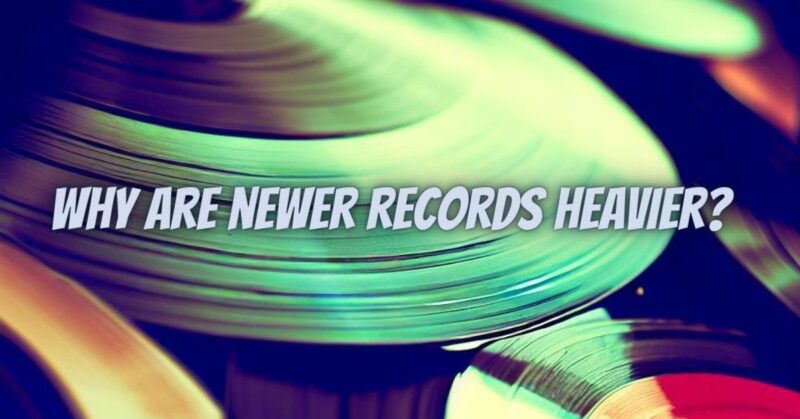Newer records are heavier than older records for a number of reasons, including:
- The quality of the vinyl: Newer records are often pressed on higher quality vinyl than older records. This is because the vinyl manufacturing process has improved over time, and higher quality vinyl is less susceptible to warping and other damage.
- Mastering and pressing technology: Mastering and pressing technology has also improved over time, and newer records are often mastered and pressed with more precision than older records. This can lead to a number of improvements, including better sound quality and reduced surface noise.
- The rise of audiophile culture: In recent years, there has been a resurgence in interest in vinyl records, and this has led to an increased demand for high-quality vinyl products. Audiophile consumers are willing to pay a premium for records that are pressed on high-quality vinyl and mastered and pressed with precision.
Benefits of heavier vinyl
Heavier vinyl offers a number of benefits over lighter vinyl, including:
- Improved sound quality: Heavier vinyl is less susceptible to warping, which can lead to better sound quality. Additionally, the increased weight of heavier vinyl can help to improve the tracking of the stylus, which can also lead to more accurate sound reproduction.
- Reduced surface noise: Heavier vinyl is also less susceptible to surface noise, which is the crackling and hissing that can sometimes be heard on vinyl records. This is because the thicker material helps to reduce the resonance of the record, which can lead to less surface noise.
- Increased durability: Heavier vinyl is also more durable than lighter vinyl. This is because the thicker material is less susceptible to scratches and cracks. This makes heavier vinyl records less likely to be damaged during playback or storage.
Other factors to consider
In addition to the factors mentioned above, there are a few other things to consider when deciding whether or not to purchase heavier vinyl:
- The quality of the recording: The quality of the recording itself will have a significant impact on the sound quality of the vinyl record, regardless of the weight of the record. If the recording is poorly made, then even a heavier vinyl record will not sound good.
- The condition of the record: The condition of the record can also have a big impact on the sound quality. A record in poor condition, regardless of the weight, will not sound as good as a record in good condition.
- The playback system: The playback system that you use to play your vinyl records can also affect the sound quality. A high-quality turntable and cartridge will help to produce the best possible sound quality, regardless of the weight of the record.
Overall, heavier vinyl offers a number of advantages over lighter vinyl, including improved sound quality, reduced surface noise, and increased durability. However, it is important to note that heavier vinyl is also typically more expensive than lighter vinyl. Additionally, not all turntables are compatible with heavier vinyl, so it is important to check the specifications of your turntable before purchasing heavier vinyl records.
Whether or not to purchase heavier vinyl is a personal decision. If you are serious about listening to vinyl records and you have the budget, then heavier vinyl can be a good option. However, if you are on a tight budget or you are not sure if you will appreciate the difference in sound quality, then lighter vinyl is a good and affordable alternative.


